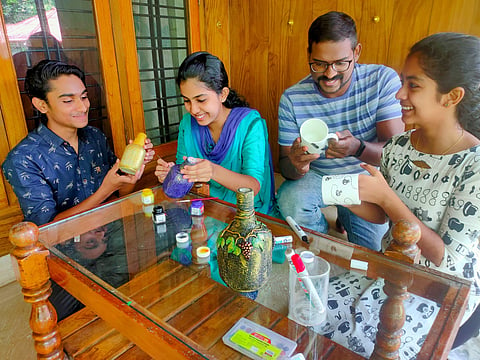

Before Zoom and Microsoft Teams added the option of captions, students who were hearing impaired struggled to catch up with classes. Robin Tommy, who heads TCS’ Rapid Labs in Thiruvananthapuram, has worked numerous times with specially-abled children and has seen, up close, the kind of mental stress it causes them to constantly feel out of the loop due to this technical divide. So, he decided to do something about it.
“We have been working with special needs children for over five years now and we help them by developing technology that supports their needs,” says Robin, adding, “We want to improve their quality of life. We started with children who had cerebral palsy. Our intention was to gamify the rehabilitation process and build communication tools. In the last two years, especially due to COVID, we have realised the need to develop a whole community around this process so that we can actually support more students on a larger scale.”
To this effect, Kala4Care was set up last August, merging these technological goals with art — with Robin as its Community Leader. In association with a group of artists and students and Punarjeeva — a start-up that develops assistive technology and sensor fusion for physical rehabilitation, the idea behind this initiative is to raise enough money for the research and development of this assistive technology for special needs students. The money is raised through art sales and by engaging with the general public to make them aware.
With Ashna Benny as the Art Director, the Kala4Care project was first introduced in the village of Valakayam in Kottayam. The MSW graduate (and artist herself) has tapped into people’s newfound love for gardening during the lockdown — creating environment-friendly pots by upcycling old cups and glasses. These were first sold among friends and relatives, and the output of each sale was contributed towards research in assistive technology. Her sister Reshma is also an active member.
Explaining the reality of most special needs children, Robin says, “Most children and even adults with special needs are often helpless when alone. Even if they are faced with an emergency situation, they have to call out for or communicate with somebody. Many of them can only manage to make small sounds, so parents or caretakers may not always be able to hear them or get to them in time. And if they need to use the toilet and accidentally lose bladder control, it can be very demotivating."
Talking about the technology and AI-driven solution they have in place now, Robin says, “What we do is, in each specialised case, we record the motions of whichever part of the body the special needs individual is able to move. So now, if they move around five times, the AI will be able to recognise the action and alerts the caretaker. The alert that is sent can be about a particular prompt, like wanting to use the toilet or get a glass of water, and the AI automatically selects it and announces it through the speaker. If the child is incapable of any movement at all, they simply need to raise an red-coloured object, which the system will recognise before announcing the requirement.”
One of Kala4Care's most landmark technological solutions is Mozhi. Designed for students who have hearing impairment, the open-source application helps convert their speech to text in a number of languages. Mozhi helps them learn and even types out each word onto a computer which the students can independently use to do their classwork. “The idea is to improve their quality of life,” says Robin, “Of course, we can’t heal them or make life completely easy for them but we can make it significantly better. That’s what Kala4Care is all about. Punarjeeva gives us a lot of tech support when it comes to this. Currently, we have a team of around 20 students of all ages with a singular aim to simply offer support to the people who really need it.”
